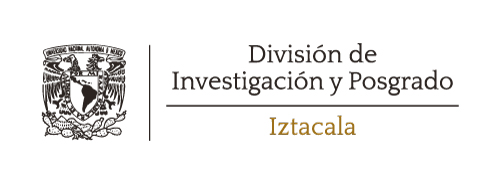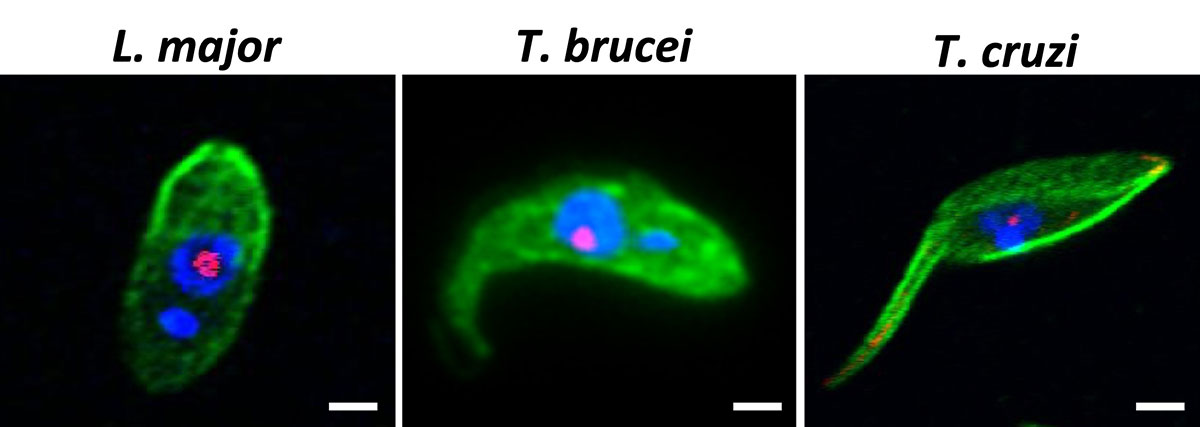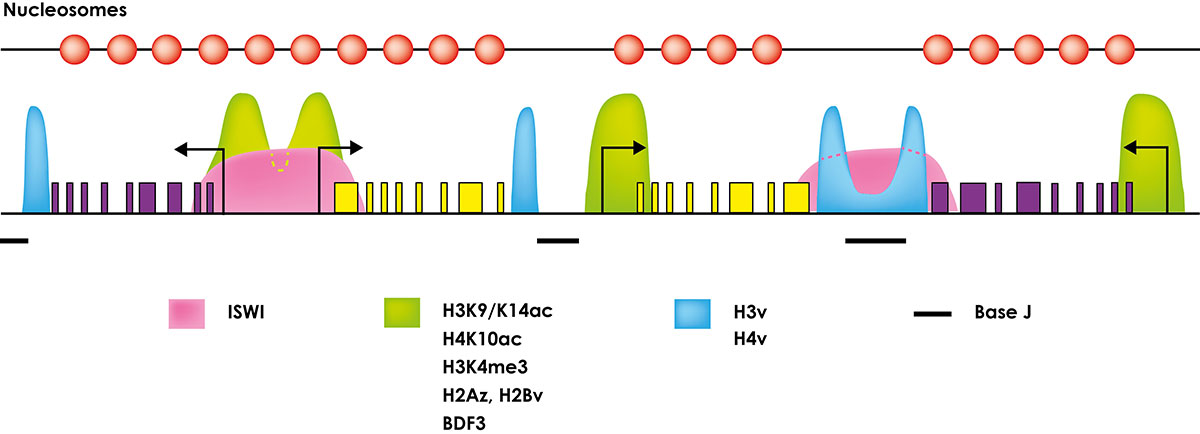
| Location within campus: | Laboratory: 1 Biomedicine |
| Phone: | 55 5623-1333 ext. 39781 |
| Head of Laboratory: | Dr. Santiago Martínez Calvillo Full Professor scalv@unam.mx |
| Researchers affiliated to the laboratory: | Dr. Tomás Nepomuceno Mejía tnepomuceno@unam.mx |
| Technicians affiliated to the laboratory: | Biól. Luis Enrique Florencio Martínez luisef@unam.mx |
| Research lines per researcher: | Dr. Santiago Martínez Calvillo Studies the mechanisms of genetic expression in protozoan parasites of the Leishmania and Trypanosoma genera. Dr. Tomás Nepomuceno Mejía Studies the cell biology of the nucleus of these parasites. |

In our laboratory we are interested in the study of the molecular and cellular biology of flagellate parasites belonging to the Trypanosomatidae family, which includes various species of the Leishmania and Trypanosoma genera. These organisms, known as trypanosomatids, possess unique biological characteristics within eukaryotic organisms, which makes them a very interesting group to study.
Among our lines of research we have the study of the mechanisms of genetic expression in these parasites. In particular, our interest is directed towards the characterization of promoter regions of RNA Polymerase III (Pol III), which synthesizes essential RNA molecules such as tRNAs, 5S rRNA and snRNAs. We are also interested in identifying and characterizing the proteins that are part of the Pol III transcription complex (Pol III subunits and transcription factors). We are also interested in analyzing the structure of chromatin and its impact on transcription. Another of our research interests is focused on the cell nucleus, especially in the detailed description of the nucleolus and other nuclear bodies of Leishmania and Trypanosoma. To achieve this we use molecular biology methodologies, various types of microscopy and proteomics.

Martínez-Calvillo, S., Florencio-Martínez, L.E., Nepomuceno-Mejía, T. (2019). Nucleolar Structure and Function in Trypanosomatid Protozoa. Cells 2019, 8, 421. ISSN: 2073-4409. https://www.mdpi.com/2073-4409/8/5/421
Román-Carraro, F.C, Florencio-Martínez, L.E., Romero-Meza, G., Nepomuceno-Mejía, T, Carrero, J.C., Arroyo, R, Ortega-López, J., Manning-Cela, R. y Martínez-Calvillo, S. (2019). TFIIIB subunit Bdp1 participates in RNA polymerase III transcription in the protozoan parasite Leishmania major. BioMed Research International. Volume 2019, Article ID 1425281. ISSN: 2314-6141. https://doi.org/10.1155/2019/1425281
Nepomuceno-Mejía, T., Florencio-Martínez, L.E., y Martínez-Calvillo, S. (2018). Nucleolar division in the promastigote stage of Leishmania major parasite: A Nop56 point of view. BioMed Research International. vol. 2018, Article ID 1641839. ISSN: 2314-6141. https://doi.org/10.1155/2018/1641839
Romero-Meza, G., Vélez-Ramírez, D. E., Florencio-Martínez, L. E., Román-Carraro, F. C., Manning-Cela, R., Hernández-Rivas, R. y Martínez-Calvillo, S. (2017). Maf1 is a negative regulator of transcription in Trypanosoma brucei. Molecular Microbiology, 103: 452–468. ISSN: 1365-2958. https://onlinelibrary.wiley.com/doi/full/10.1111/mmi.13568
Rojas-Sánchez, S., Figueroa-Angulo, E., Moreno-Campos, R., Florencio-Martínez, L. E., Manning-Cela, R. G. and Martínez-Calvillo, S. (2016). Transcription of Leishmania major U2 small nuclear RNA gene is directed by extragenic sequences located within a tRNA-like and a tRNA-Ala gene. Parasites & Vectors 9:401. ISSN: 1756-3305. https://parasitesandvectors.biomedcentral.com/articles/10.1186/s13071-016-1682-3

| Prospective Thesis Candidate Profile: | Students interested in studying molecular and cellular biology in unicellular parasites. |
| Service Social Data: | Transcriptional analysis of RNA polymerase III in trypanosomatid parasites. Registration code: 2020-12 / 63-879. Cellular and molecular biology of the nucleolus of pathogenic trypanosomes. Registration key: 2019-12 / 63-3938. Very diverse molecular and cellular methodologies will be used in both programs. |


